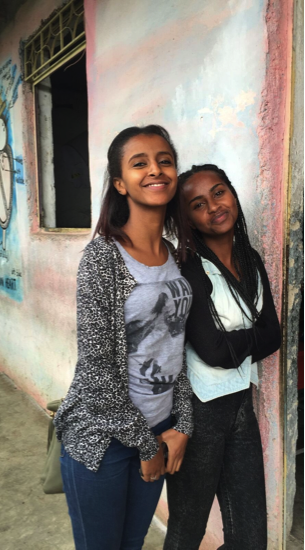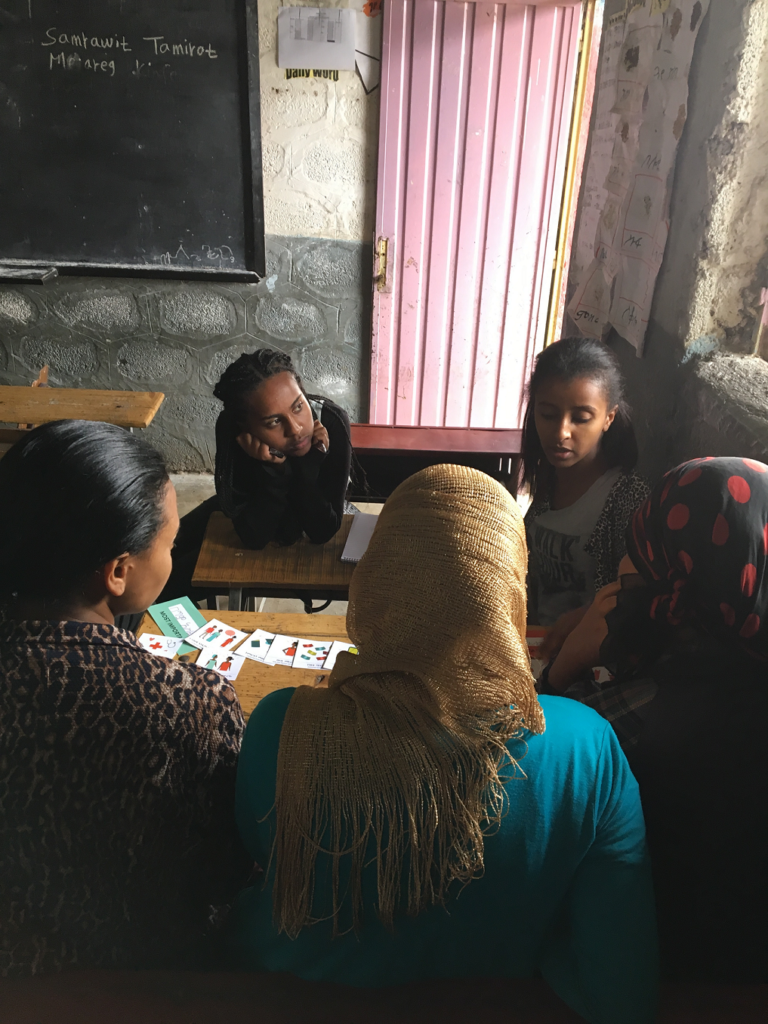Collaborating with Youth to Solve Adolescent Sexual and Reproductive Health Challenges
“You are committing a historic mistake by introducing contraception for the 15-19,” was definitely not the reaction Ethiopian young designer, Eden Befekadu, expected to hear as she stood in front of the crowd that warm March morning. An admittedly shy 19-year-old, it took courage for her to speak up in front of strangers.
“The way he was looking at me was not nice. I think he saw me as someone outside the norm of society.”
Nevertheless, she was determined to share what she had learned over the last year with the adults that filled the room. She hadn’t spent the last seven months conducting dozens of interviews, developing insights, and prototyping solutions for nothing. “Adolescents aren’t considered people who can talk about something serious. [But] We knew what we were doing and we knew how to address them,” she shared, her voice growing more confident. “I’ve experienced a lot and was very proud to address them.”


Photo Credit: ©Population Services International
A year ago, this would’ve been a very different story. Eden is much like any other young girl. Her hair parted into long, thick braids, and she likes to show off her OVO cell phone case, so it’s obvious she loves musicians Drake and The Weeknd. And she didn’t have much information when it came to contraceptives and youth in Ethiopia either. “I had a lack of information. I didn’t know that there was a huge amount of girls that need contraceptives.”
All of that changed after Eden’s friend suggested she apply for the role of young designer with Adolescents 360 (A360), a four-year project, funded by the Bill & Melinda Gates Foundation and the Children Investment Fund Foundation, , that works directly with youth in Ethiopia, Tanzania, and Nigeria to design solutions for the unmet contraceptive needs of their peers. The stakes are high: globally, pregnancy is the second-leading cause of death for girls aged 15 to 19.
“After learning about the project, I realized that it’s about adolescents. It’s about me,” she shared. “And I can help other adolescents. I could become a voice for youth.”
PSI/Ethiopia A360 Program Director, Metsehate Ayenekulu, sees the value of having Eden’s voice present too. “Bringing the young people in the room as decision makers challenges the status quo. [Their contribution] ensures that solutions are serving them and their peers, instead of serving the adults’ point of view.” And with young designers in the room since day 1 of the A360 formative research boot camp in Addis Ababa, Eden and her peers’ contributions to the project have only increased over time. Their role currently has them testing prototypes with youth in Oromia.
Fast forward to a year later, back to that small room in Adama. “I can’t speak for the group as a whole, but the one who said it’s a historic mistake; I don’t think he understood us.” Despite the discouragement of some voices, “There were other people…they were impressed,” she said. One woman even approached Eden to suggest other areas where they might talk to girls in her neighborhood.
Regardless of the mixed response, Eden knows that she and her fellow young designers add immeasurable value to A360. “Youth involvement is very critical for this project because… we serve as a bridge between [adults] and adolescents. The adolescents open up to us.” And it’s clear to her that she’s gained a lot from the project too. “It helped me to express my feelings and talk out loud about things related to adolescents. It’s very inspiring because it’s giving me a chance to create solutions for the adolescents out there including myself. This is a chance for me to help those in need. And at my age, being able to work with people at PSI or people from different professions is a huge experience.”
Adolescents 360 (A360) is a four-year project aimed to increase access to and uptake of voluntary modern contraception among adolescent girls (15-19 years old) in Tanzania, Ethiopia and Nigeria. The project fuses public health, marketing, human-centered design, developmental neuroscience, and cultural anthropology and meaningfully engages young people in the design and delivery of solutions that respond to their specific and varied needs. A360 is led by Population Services International, together with IDEO.org, the Center on the Developing Adolescent at the University of California Berkeley, Triggerise, and the Society for Family Health Nigeria. A360 is funded by the Bill & Melinda Gates Foundation and the Children’s Investment Fund Foundation.
